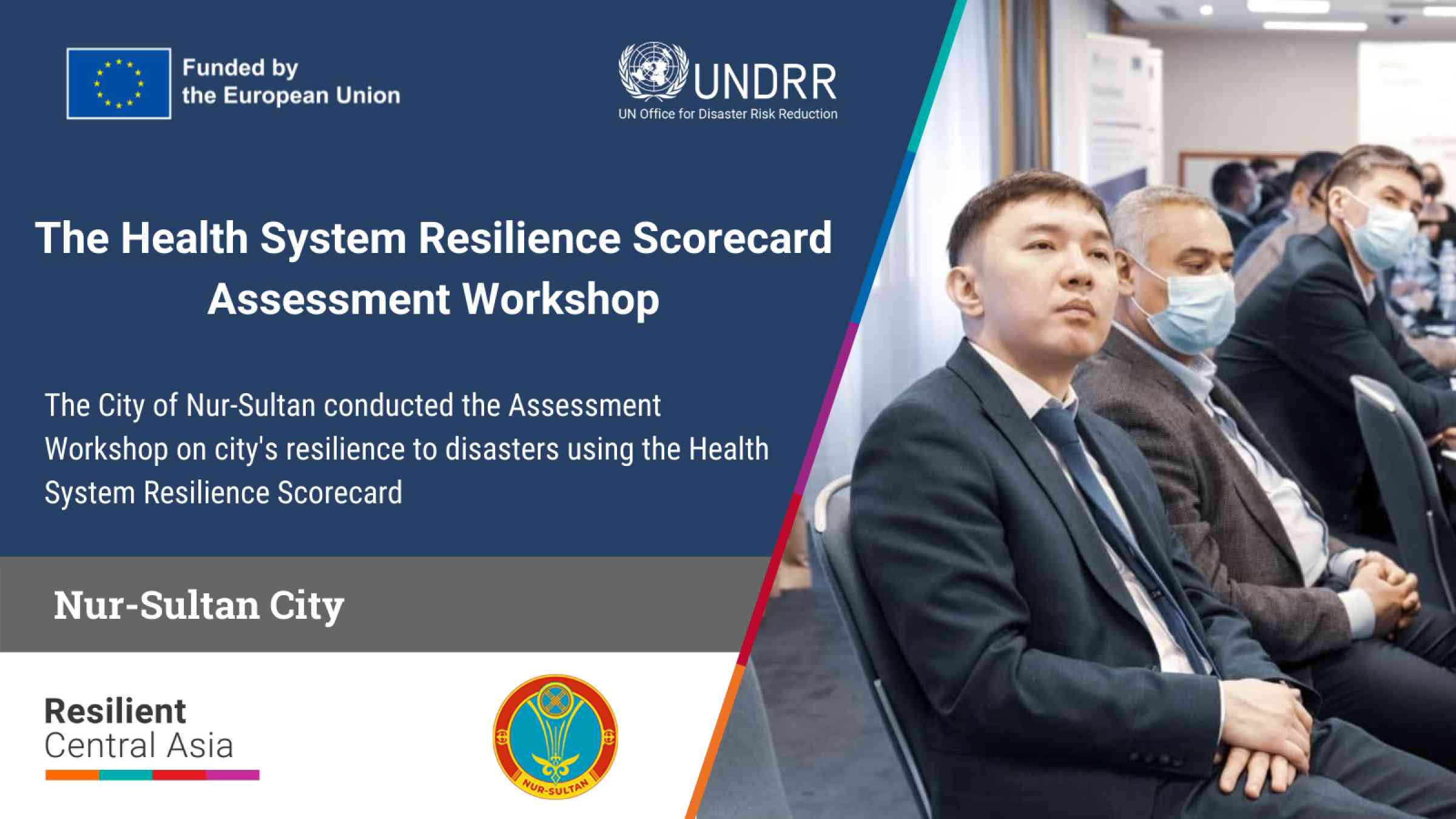Nur-Sultan city assesses its disaster resilience with a focus on health systems

On 30 November 2021, the city of Nur-Sultan, in cooperation with the United Nations Office for Disaster Risk Reduction (UNDRR), the European Union (EU) and the World Health Organization (WHO) in Kazakhstan, conducted an assessment of the resilience of the public health sector of the city to disasters. This assessment is one in the series of assessments of overall resilience to disasters, aiming at developing recommendations for the local strategy on disaster risk reduction.
This workshop took place at a time when across the region, every single country is facing a real threat of COVID-19 resurgence, or already fighting it. The current pace of transmission is of grave concern and COVID-19 cases are once again approaching record levels. Nur Sultan, like many cities, is no exception. COVID-19 has challenged health systems in particular and demonstrated the need for a whole-of-government approach that leverages the capacities of all relevant departments, with local government bodies responsible for disaster risk playing a crucial role.
The workshop provided guidance to representatives of the department of emergency situations, the city public health sector, including public hospitals, city polyclinics, ambulance services and pharmaceutical companies in assessing and identifying the gaps in local resilience planning with the focus on health systems. Preparedness and ability of health systems to cope with possible new risks are the focus of the assessment of the resilience of the health sector. The Public Health Addendum to the Disaster Resilience Scorecard for Cities has been designed to assess and to determine gaps in preparedness of the health systems to biological hazards.
Mr. Aglan Kadybaev, the Deputy Head of the Center of Urbanism of Nur-Sultan, said: “The city has become a concentration of extremely complex problems: it is not always safe for its residents. The variety of risks and challenges posed by natural, technological and biological hazards require compliance with rules and regulations”.
Mr. Robert Brudzynski, the Programme Officer of the EU Delegation in Kazakhstan stressed the importance of working with the capital cities of Central Asia to support local governments in mitigating risks and promoting a holistic and systematic approach to urban resilience.
Mr. Andrew Bower, UNDRR Team Lead for Disaster Risk Governance emphasized that “the discussions conducted today and findings of the assessment will serve as the baseline for the development of recommendations to enhance the resilience of Nur-Sultan. The results of discussions and recommendations for action can further advance resilience, support recovery efforts from COVID-19, as well to showcase good practices that other cities and countries can learn from”.
This work is part of the EU-funded Initiative “Strengthening disaster resilience and accelerating implementation of the Sendai Framework for Disaster Risk Reduction in Central Asia”, implemented by UNDRR. This project will contribute directly to the achievement of the SDG 11 and other global frameworks, including the Sendai Framework for Disaster Risk Reduction, the Paris Agreement and the New Urban Agenda in the region. On the national level, the project supports strengthening regional coordination, the development of regional DRR strategy, national disaster loss accounting systems, and community- level disaster risk reduction. The EU committed EUR 3,750,000 for the three-year implementation.
Background information
The assessment was conducted under the Central Asia Initiative “Strengthening disaster resilience and accelerating implementation of Sendai Framework for Disaster Risk Reduction in Central Asia 2019-2022”, implemented in the five countries of the region. UNDRR within this Initiative engages with the capital cities in the region to support local governments to reduce risks and advance a holistic and systemic approach to urban resilience. The engagement of Central Asian capital cities in the MCR2030 Global Initiative can leverage the implementation of this project, as cities joining MCR2030 will have access to tools and resources from partners to progress on the resilience roadmap.
For additional information please contact:
Mr. Abdurahim Muhidov, UNDRR Regional Programme Coordinator, at: muhidov@un.org,
Ms. Elnura Abakanova, Communications Officer, EU Delegation to Kazakhstan, at: Elnura.ABAKANOVA@eeas.europa.eu
Explore further
Is this page useful?
Yes No Report an issue on this pageThank you. If you have 2 minutes, we would benefit from additional feedback (link opens in a new window).